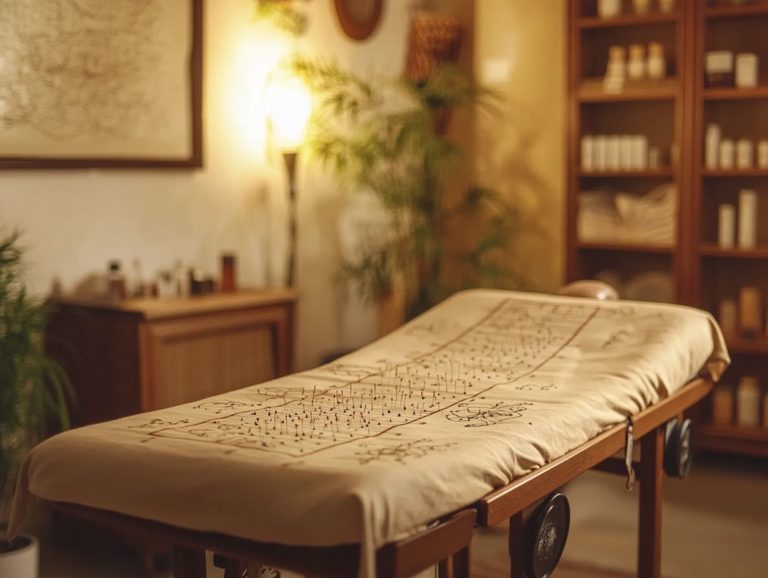Acupuncture vs. Traditional Medicine: A Comparative Guide
If you’re curious about natural ways to improve your health, exploring acupuncture and traditional medicine can be life-changing!
In recent years, your interest in alternative healing practices has likely surged, particularly in methods like acupuncture and traditional medicine.
Both approaches provide unique perspectives on health and wellness, yet grasping their principles, benefits, and applications can feel overwhelming.
This overview delves into acupuncture and traditional medicine, exploring their histories, mechanisms, and effectiveness.
Whether you’re seeking relief from chronic conditions or looking to enhance your overall well-being, this guide will assist you in navigating these healing options, empowering you to make informed choices tailored to your needs.
Contents
- Key Takeaways:
- Overview of Acupuncture and Traditional Medicine
- How Acupuncture Works
- How Traditional Medicine Works
- Benefits of Acupuncture
- Benefits of Traditional Medicine
- Comparison of Effectiveness
- Choosing the Right Treatment for You
- Preguntas Frecuentes
- 1. Cu l es la diferencia entre la acupuntura y la medicina tradicional?
- 2. Qu enfoque es m s efectivo para tratar condiciones m dicas?
- 3. Existen riesgos asociados con la acupuntura y la medicina tradicional?
- 4. Se pueden usar la acupuntura y la medicina tradicional juntas?
- 5. C mo se compara el costo de la acupuntura con la medicina tradicional?
- 6. Es un enfoque mejor que el otro?
Key Takeaways:
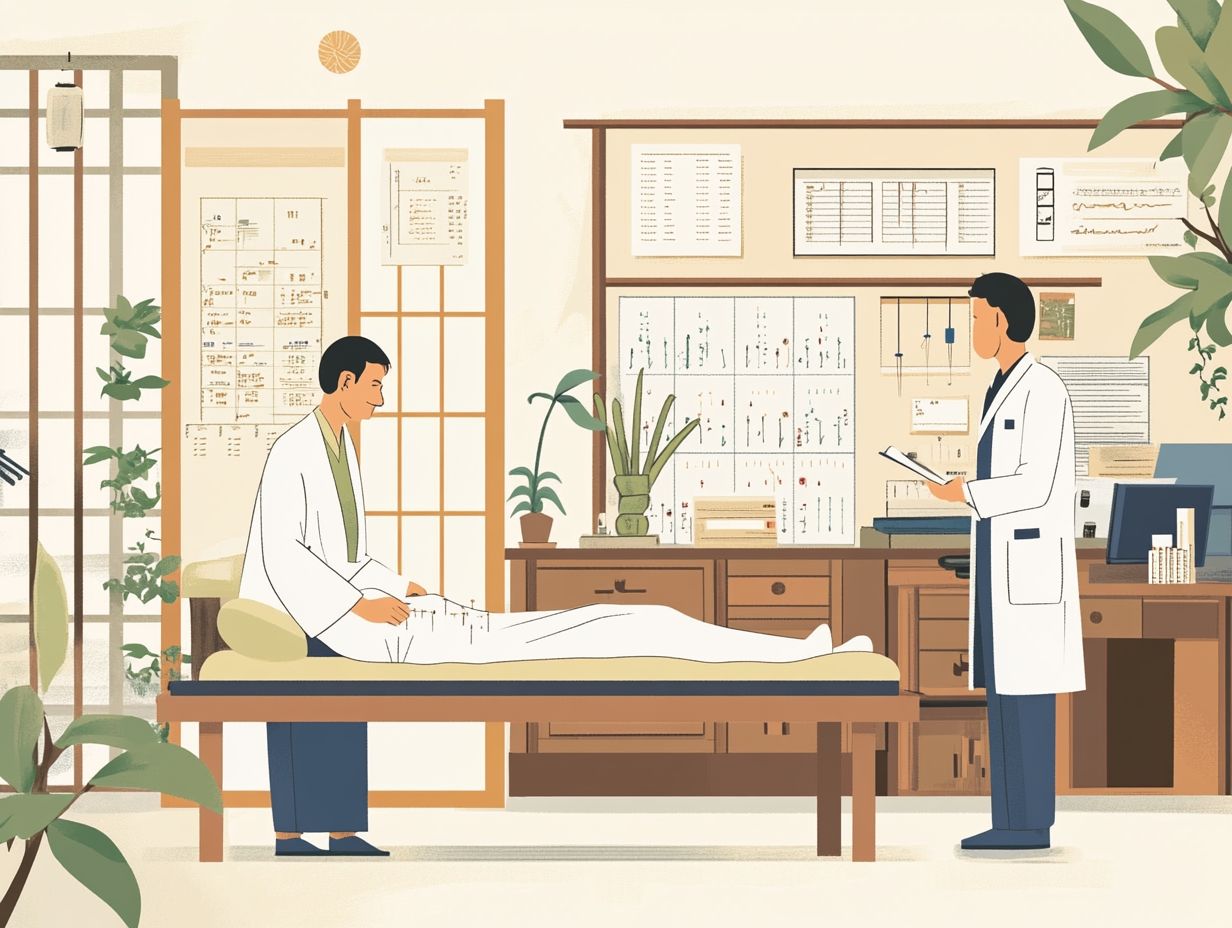
Acupuncture and traditional medicine have different origins and approaches, but both aim to improve overall health and treat various conditions. Both methods have numerous benefits, including enhancing physical and mental health and addressing chronic conditions. However, effectiveness can vary for each individual. It’s important to talk to a healthcare professional to find the best treatment for you.
Overview of Acupuncture and Traditional Medicine
Acupuncture is an ancient healing art deeply rooted in Traditional Chinese Medicine (TCM), designed to restore balance and harmony within the body by stimulating specific acupuncture points with fine needles.
This holistic approach has gained international recognition as a form of complementary medicine, helping the energy flow to alleviate symptoms and enhance overall well-being.
Acupuncture has evolved to include variations like medical acupuncture, which seamlessly integrates evidence-based practices to boost treatment effectiveness.
Definition and History
Acupuncture is a therapeutic technique rooted in Traditional Chinese Medicine (TCM) that involves the precise insertion of fine needles into specific points on your body to influence the flow of qi, pronounced ‘chee,’ and restore balance. This ancient practice has a rich history, tracing its origins back over 2,500 years.
Early references can be found in foundational texts like the Huangdi Neijing, also known as the ‘Yellow Emperor s Inner Canon,’ which outlines the core principles of Chinese medicine and emphasizes the importance of qi. Notable historical figures, such as renowned physicians Bian Que and Zhang Zhongjing, played pivotal roles in shaping acupuncture through their writings and practices.
Once a closely guarded secret among practitioners, acupuncture has evolved into a recognized therapy that transcends its cultural origins. As practitioners and researchers delve into its therapeutic potential, acupuncture finds its place within modern medical paradigms, proving effective in managing pain and enhancing overall wellness.
How Acupuncture Works
Acupuncture operates by targeting specific acupuncture points on your body with fine needles. This technique encourages energy flow and activates your body’s natural healing responses, effectively alleviating a range of health issues, from chronic pain to emotional stress.
Principles and Techniques
The principles of acupuncture revolve around the concepts of meridian points and the five elements, placing a strong emphasis on patient assessment through pulse evaluation and tongue diagnosis.
This approach allows for the creation of highly effective treatment plans tailored specifically to individual needs.
At the heart of these principles lies a profound understanding of the body s energy, or Qi, which flows through a complex network of meridians. Each meridian is intricately linked to specific organs and functions, enabling practitioners to accurately diagnose imbalances or blockages.
By prioritizing personalized assessments, acupuncturists can craft strategies that directly address your unique symptoms and health history.
This holistic methodology not only boosts the effectiveness of treatments but also encourages your active participation in your wellness journey, beautifully reflecting the integration of Traditional Chinese Medicine principles into clinical practice.
How Traditional Medicine Works
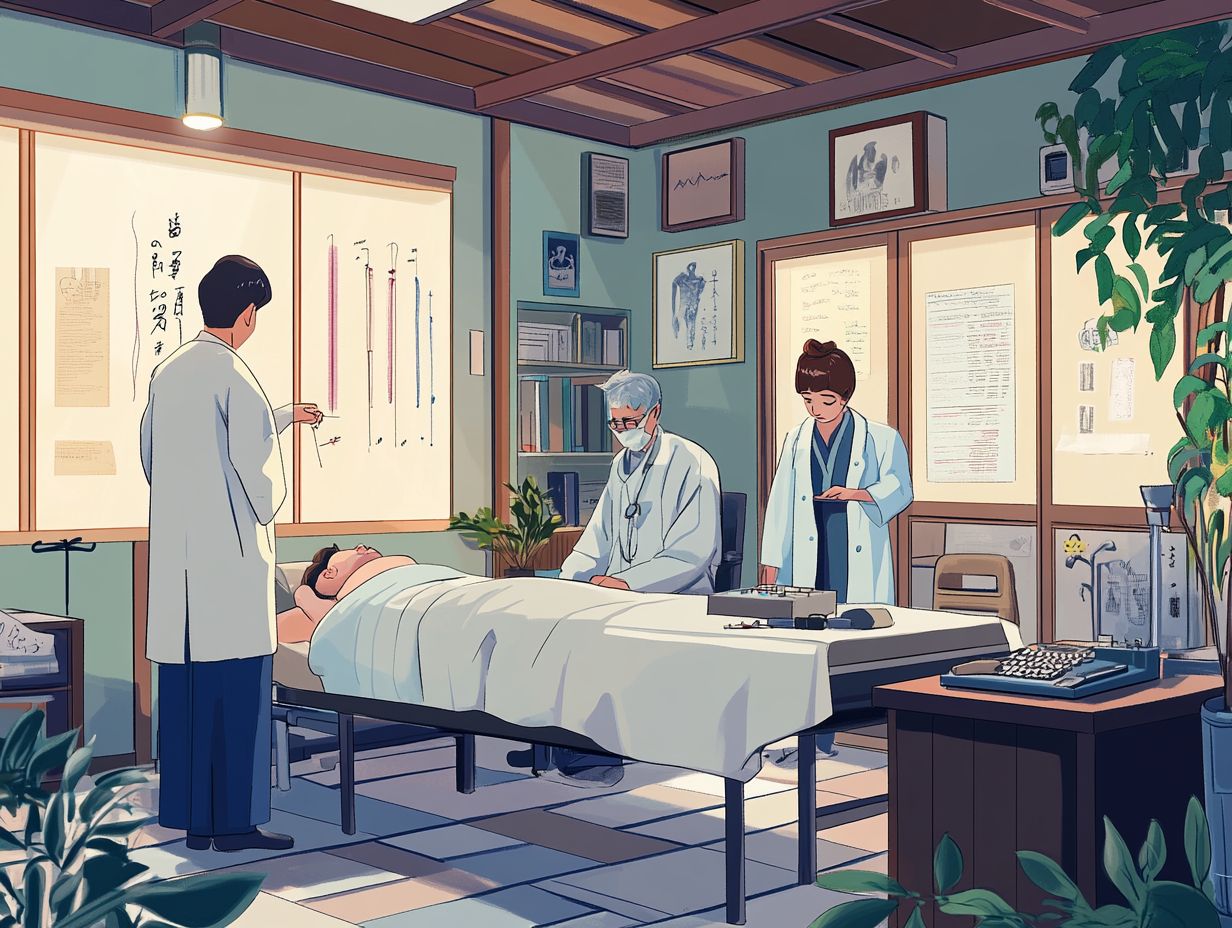
Traditional medicine, particularly Traditional Chinese Medicine (TCM), values natural healthcare.
It promotes holistic approaches that enhance your body’s healing abilities and strengthen your immune system.
Principles and Treatment Methods
The principles of traditional medicine emphasize crafting personalized treatment plans specifically designed to address chronic conditions like digestive disorders and respiratory issues.
These plans often combine various treatment methods, including herbal remedies that draw from centuries of knowledge and their associated health benefits.
Dietary adjustments are vital in this mix. Practitioners firmly believe that food can either nourish or disturb the body’s natural balance.
Massage and meditation complement these efforts by alleviating stress and promoting overall wellness.
Acupuncture, a fundamental aspect of Traditional Chinese Medicine (TCM), works in harmony with these practices, aligning the body s energy and reinforcing the broader philosophy that health encompasses emotional, physical, and spiritual well-being.
Benefits of Acupuncture
Discover the amazing benefits of acupuncture! It offers effective relief from chronic pain and reduces stress.
This ancient therapy is not just a treatment for specific medical conditions; it s a powerful tool for promoting overall wellness.
Improving Physical and Mental Health
Acupuncture offers profound benefits for both your physical and mental well-being.
It delivers pain relief and alleviates emotional stress by balancing your body’s energy.
This ancient practice effectively alleviates chronic pain conditions, such as arthritis and back pain, by stimulating specific points on your body.
This stimulation encourages the release of endorphins and promotes natural healing.
Regular treatments can lead to significant reductions in anxiety and depression, as balanced energy flow restores your emotional tranquility.
By embracing this holistic approach, you not only experience relief from physical discomfort but also cultivate a greater sense of emotional stability, allowing you to achieve a more harmonious state of being.
Benefits of Traditional Medicine
The advantages of traditional medicine are found in its emphasis on preventive care strategies and its remarkable ability to manage chronic conditions through natural and holistic approaches.
This practice nurtures overall well-being and fosters a deeper connection to the body s innate healing processes.
Treating Chronic Conditions and Preventive Care
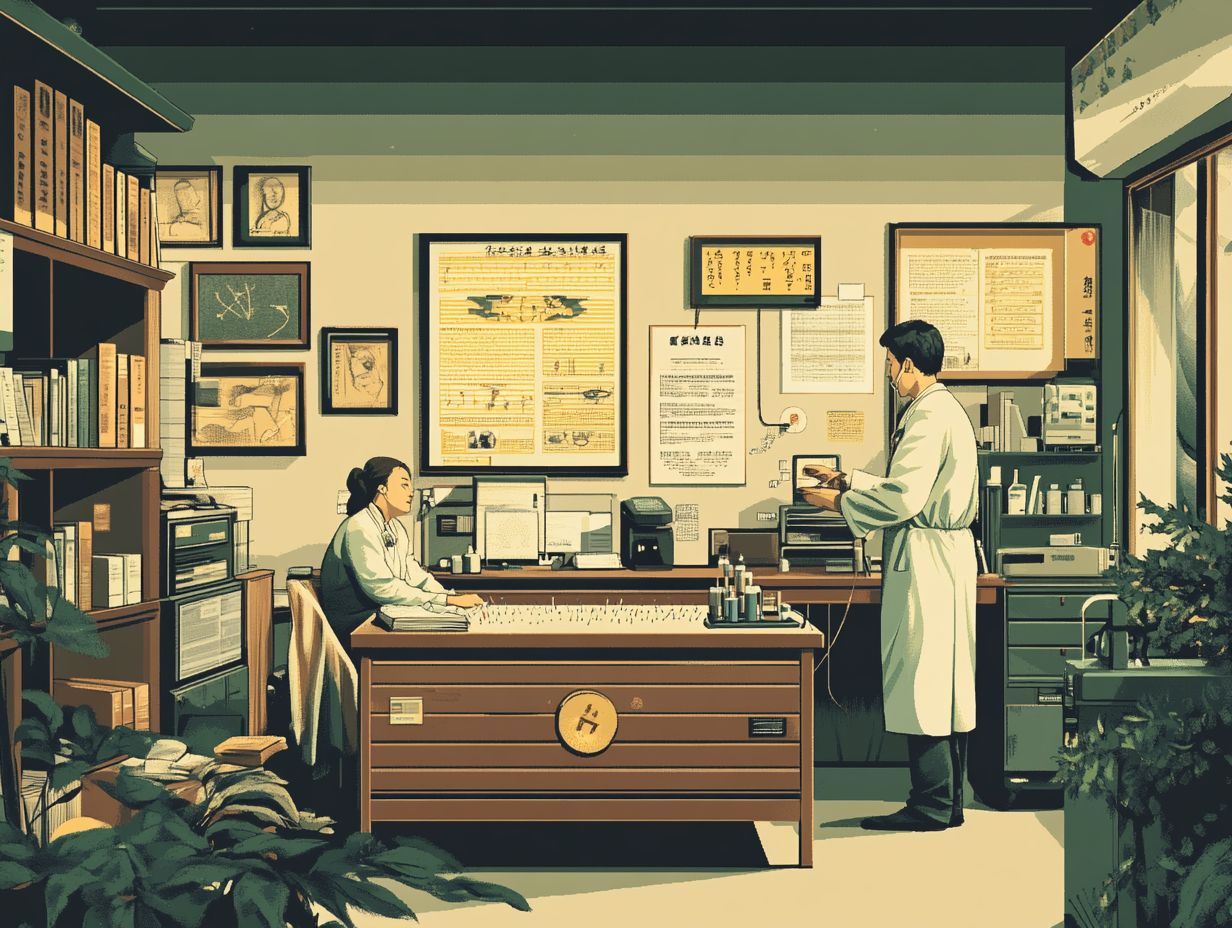
Traditional medicine places a strong emphasis on treating chronic conditions while prioritizing preventive care to enhance long-term health benefits and minimize disease risk.
Practitioners often turn to acupuncture and herbal remedies to ease chronic neck pain, effectively reducing inflammation and improving mobility.
Muscle strains can be managed with techniques like massage therapy and physical rehabilitation.
These methods offer relief for current issues and underscore the importance of lifestyle modifications, including proper ergonomics and regular stretching exercises, as vital preventive measures in healthcare management.
Comparison of Effectiveness
The effectiveness of acupuncture versus traditional medicine rests on a foundation of evidence-based research, clinical trials, and meta-analyses that meticulously assess treatment efficacy for various conditions.
By diving into this wealth of data, you can gain valuable insights into how these two approaches stack up against each other.
Now is the perfect time to explore these natural remedies and take charge of your health!
Evidence-based Research and Studies
Evidence-based research is essential for validating acupuncture and traditional medicine. Numerous clinical trials and systematic reviews evaluate their quality and efficacy. These studies look at different patient groups and conditions. They show how these practices fit into modern healthcare.
For practitioners, understanding the outcomes of these studies is crucial for making informed treatment decisions. It also helps in managing patient expectations effectively.
For patients, the implications are profound. Well-founded research can bolster their confidence in selecting alternative therapies, ultimately promoting a collaborative approach to health and wellness.
Choosing the Right Treatment for You
When selecting the ideal treatment, thoroughly assess your health history and consult with a qualified practitioner.
This collaboration will help you create a personalized treatment plan finely tuned to your unique needs and circumstances.
Factors to Consider and Consultation Process
Several factors warrant your attention during the consultation process, including your overall health, specific symptoms, and previous treatment experiences. These elements lay the groundwork for a personalized treatment plan designed to meet your unique needs effectively.
Practitioners should also consider your emotional and psychological well-being, as these factors can significantly influence your healing journey.
Another vital aspect is fostering open communication, where you feel comfortable sharing your concerns and asking questions.
This two-way dialogue aids in achieving an accurate diagnosis and builds trust, which is crucial for adhering to treatment recommendations. A thorough assessment and a collaborative approach can lead to more successful outcomes for you.
Preguntas Frecuentes
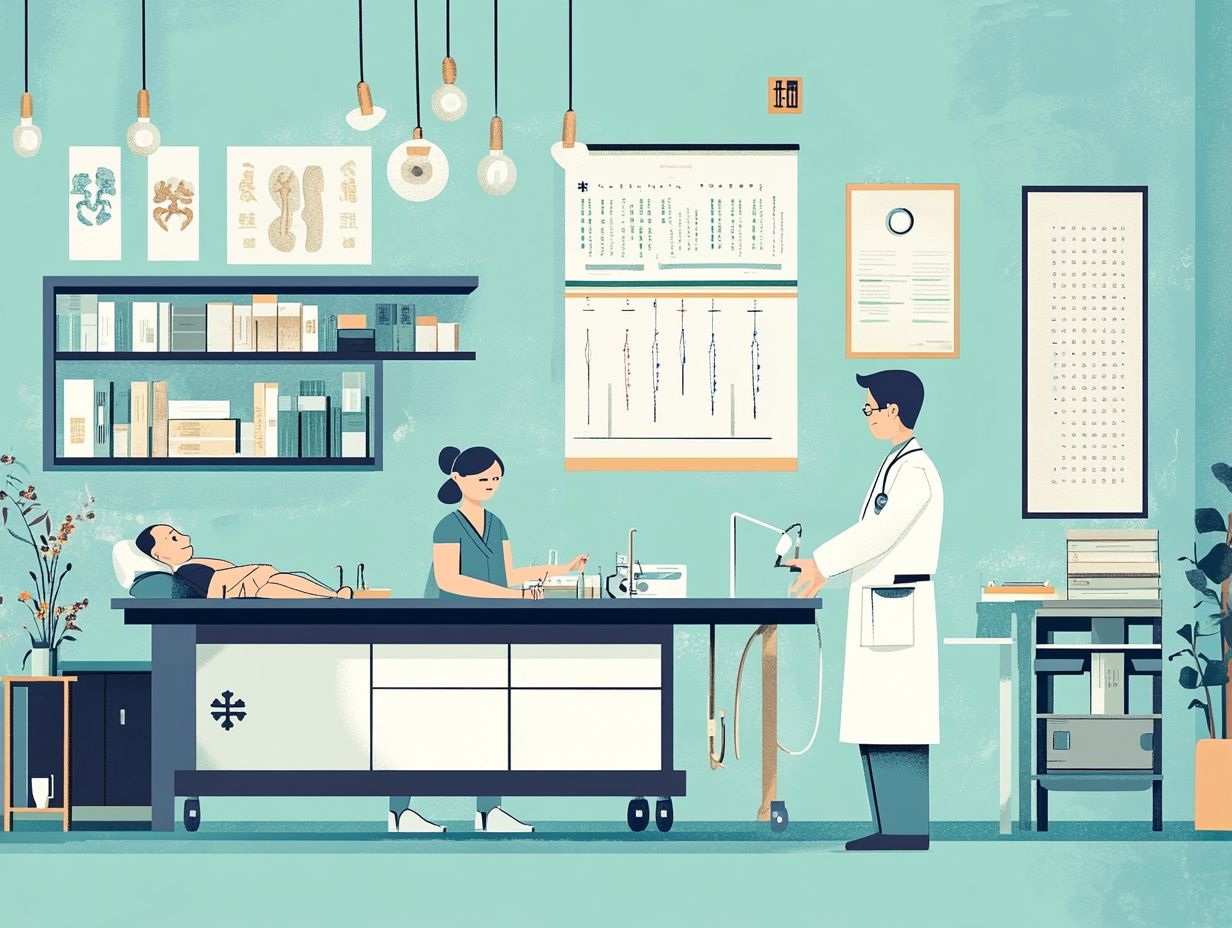
1. Cu l es la diferencia entre la acupuntura y la medicina tradicional?
La acupuntura es una forma hol stica de medicina que se origina en China e implica la inserci n de agujas finas en puntos espec ficos del cuerpo para estimular la curaci n. La medicina tradicional, por otro lado, incluye una variedad de pr cticas y tratamientos m dicos basados en creencias y pr cticas culturales.
2. Qu enfoque es m s efectivo para tratar condiciones m dicas?
La efectividad de la acupuntura y la medicina tradicional puede variar seg n el individuo y su condici n. Algunos estudios han demostrado que la acupuntura puede ser efectiva para aliviar el dolor y manejar condiciones cr nicas. La medicina tradicional puede abordar una amplia gama de problemas de salud y proporcionar alivio inmediato.
3. Existen riesgos asociados con la acupuntura y la medicina tradicional?
La acupuntura se considera generalmente segura cuando la realiza un profesional capacitado. Sin embargo, existe un riesgo de infecci n, sangrado y da o nervioso si las agujas se insertan incorrectamente. Los medicamentos tradicionales tambi n pueden tener efectos secundarios e interacciones con otros medicamentos, especialmente si contienen hierbas u otros ingredientes.
4. Se pueden usar la acupuntura y la medicina tradicional juntas?
S , la acupuntura y la medicina tradicional pueden complementarse y usarse juntas para lograr mejores resultados. Algunos practicantes de medicina tradicional pueden incorporar la acupuntura como parte de su plan de tratamiento para ciertas condiciones.
5. C mo se compara el costo de la acupuntura con la medicina tradicional?
El costo de la acupuntura puede variar dependiendo del practicante y la ubicaci n, pero generalmente es m s caro que los tratamientos de medicina tradicional. La medicina tradicional, por otro lado, puede involucrar costos continuos por medicamentos o citas de seguimiento.
6. Es un enfoque mejor que el otro?
No hay una respuesta nica a esta pregunta. Depende de tus necesidades y preferencias personales.
Tanto la terapia de puntos de presi n como la medicina convencional tienen sus propias ventajas. Consulta a un profesional de la salud para encontrar el mejor enfoque para ti.




